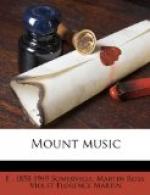From the lower side-streets of Cluhir the people fled before the flood to any shelter that the upper parts of the town could offer them. Ghastly stories were told of drowned cattle that were swept against the closed doors, and came pushing and banging at the windows, carried there by their conqueror as it were with mockery, to entreat for the succour that was too late.
When the pale dawn looked out through wind-torn clouds, it saw a half-mile breadth of racing water where had been pasture-fields; the yellow, foam-laced river was half way up the tall, slender arches of Cluhir Bridge, lapping ever higher, as if in envy, to hide the sole beauty of the ignoble town. Trees, and hayricks, broken boats, and humble pieces of cottage furniture, jostled each other between the piers, tossing and dancing in grotesque gaiety, like drunken holiday-makers on their way to the sea. The great river that is credited with exacting six lives each year, was claiming its toll. How many it took that December night does not now concern us, save, indeed, where one sad house was in question, where a wife and a son waited a long night through for the man who would not return to them.
* * * * *
Down below Cluhir, at Mount Music, old Evans crept out of the shuttered house, and fought his way in the wind, amid fallen trees, down to the big river, to see what still stood of the boathouse. The boathouse had weathered out the night. Its roof had held, its door stood firm. Old Evans surveyed it with pride.
“Aha! Protestant building!” he said, old inveterate that he was.
Then he saw on the submerged bank, amid a debris of broken rushes, and clots of foam, and branches, something that he knew instantly for what it was. The drowned body of a man.
Cautiously, and holding by shrubs and tree-stems, he reached the place, where, half ashore, half lying in thin flood through which tufts of grass were showing, with arms stretched out, grasping at the shore, the intruder lay. Old Evans knew well that fur-collared coat. Often enough he had held it for the Big Doctor. He had no need to turn the defeated face from its pillow in the broken reeds. He stared down at the man whom he had hated, with something of pity, more of cynicism.
“Well, ye wanted Mount Music!” he said, at last. “How d’ye like it now ye’ve got it?”
* * * * *
The things that a man has accomplished we sum him up by, and the things of which he was capable, and did not accomplish, are of no account, and the net that held him is of a mesh beyond the vision of most.
Who shall pity the Big Doctor, or blame him over-much? He died in the fullness of his powers, with his ambitions, as he believed, attained. He knew himself to be a good son of the Church, a faithful husband, a successfully-scheming father. What his priest thought of him is known only to his priest, but we may be sure he regretted him. A jury of his peers would have approved him in his every action. If the paths that he had followed were sometimes tortuous, along many of them he had been guided by the ankus of that mahout in whose directions his faith had taught him to confide. He had lived according to the light that he had received, and in his last act he took his life in his hand, and gave it for another.




